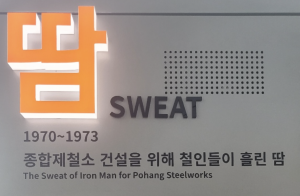Pohang: POSCO Museum
Photo essay of wall text of POSCO Museum of Pohang

Photo essay of wall text of POSCO Museum of Pohang

XXX

"At this point, the burden of mental disorders after disasters has been well documented, and interest in the course of trajectory of psychological symptoms following disasters is growing."
"Persons who live in a community where a disaster hsa occured may differ in their degree of exposure in the event. They may be affected directly, being present at the disaster site, or indirectly, having loved ones present at the disaster site or seeing images of the disaster in the media."
"Ongoing stressors such as job loss, property damage, marital stress, physical health conditions related to the disaster, and displacement are often experienced by those affected by the disaster... Low levels of and reductions in social support are also associated iwth post-disaster psychological symptoms."
Professor Adriana Petryna teaches Anthropology at UPenn. She focuses on science and technology, globalization and health, and medical anthropology. Her focuses are intertwined with DSTS Network at times, studying incidents of interest such as this article on Chernobyl, and at other times focuses on systemic health issues in socities.
Byron J. Good, the author of this book is currently a professor of Medical Anthropology at Harvard, with his research focusing on mental health services development in Asian societies, particularly in Indonesia. He has done collaborative work with the International Organization for Migration on developing mental health services in post-tsunami and post-conflict Aceh, Indonesia. More broadly, he works on the theorization of subjectivity in contemporary societies.
Entergy Corporation - Owner of Indian Point Plant, Disaster Accountability Project - Nonprofit disaster response 'auditing' organization, Nuclear Regulatory Commission, Steven Peterson - Director of Emergency Management, Ulster County, NY, Dana Smith - Dutchess County comissioner of emergency response
That humanitarian aid struggles to address gender-based violence, such as sexual assault and rape, and even as it has become more addressed and medicalised it has potential to break down in due to the neutral stance taken by foundations such as MSF.
It doesn’t appear to be particularly well-utilized in the news sector, appearing in an article in Journalist’s Resource in 2014. There was no evidence that I could find that it had been used as a source in other studies.
'Most organizations have their own definitions and categories for reporting incidents, which makes comparative research difficult'
'Typically, perpetrators have complex and even compound motives for committing violence.'
'Finally, there are ethical challenges to gathering more data and disseminating research. These range from the universal, such as ensuring that research does not inadvertently do harm, addressing concerns over patient confidentiality and appropriately sharing the findings with research participants, to concerns specific to research in complex security environments'